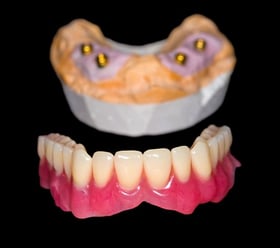Today there are more options than ever when it comes to replacing teeth lost through decay, accidents or simply aging.
 The National Institute of Dental and Craniofacial Research found that nearly four percent of adults - or roughly one in 25 adults aged 20 to 64 - had none of their adult teeth left, and adults tend to lose four teeth (on average) throughout their adult lifespan.
The National Institute of Dental and Craniofacial Research found that nearly four percent of adults - or roughly one in 25 adults aged 20 to 64 - had none of their adult teeth left, and adults tend to lose four teeth (on average) throughout their adult lifespan.
The need for innovative solutions has never been greater. That's why dentists around the country have rallied around new procedures that rely on implant supported dentures to restore normal chewing function and give smiles back one patient at a time.
Seven Facts About Implant Supported Dentures
Patients missing one or multiple teeth often look towards crowns and bridges, respectively, to combat the effects of tooth decay.
The fact that patients can have any one of their missing teeth replaced with a dental implant and a crown while relaxed and sedated is a huge boon. Some older patients, or those who've suffered the more acute effects of tooth decay and gum disease, might even benefit from a fixed bridge, which provides aesthetics, comfort and stability.
http://www.manndental.com/dental-implant-services
That's really the difference that implants and fixed bridges can make in patients lives - stability. Implants are a more permanent solution to the distressing reality of missing teeth. Moreover, implants can be used as the foundation for dentures.
- Fact #1: Implants Complement Dentures
They are often referred to as overdentures since they're essentially dentures that are fortified by implants. In fact, These dentures are affixed to implants using connectors: this gives patients more support while taking pressure off of the patient's jaw arch.
This kind of denture would typically be used when patients are missing all of their teeth on one arch yet there's adequate bone structure in the jaw itself to support implants. They have actually overcome many of the challenges that patients run into with regular dentures; namely, the further deterioration of their jaw arch.
- Fact #2: Similar Rules Apply
Although implant supported dentures are securely anchored into implants and further fortified with connectors, you can take out the overdentures at night.
Most dentists, indeed, encourage patients to do so before cleaning their dentures and accoutrements. It's important to follow all of the instructions that your dentist provides you at the outset.
- Fact #3: Implant-supported Dentures are ideal for full replacement of Lower Jaw Teeth
Dentures that are supported by implants work very well on the lower jaw. Why? Because regular, removable dentures tend to be less stable in that area of the mouth.
There are two additional reasons why dentists and patients alike prefer dentures that are supported by implants for the lower arch.
The first, more obvious, reason is that regular dentures tend to remain stably in place on the upper arch and, secondly, the chewing motion itself tends to put more tension on the lower arch over time. This tension can, in turn, cause deterioration in the jaw arch itself.
http://www.manndental.com/blog/what-are-dental-teeth-implants
- Fact #4: Two Kinds of Implant Retained Dentures
The connector type that holds the denture to the implants comes in two types: bar-retained and ball-retained attachments.
The former features a metal bar that traces the contour of the patient's arch; the bar is then affixed to implants coursing along the patient's jaw arch. Connectors further hold the denture in place, restore patients' chewing function and ameliorate that sunken-cheek look that plagues some victims of tooth loss.
Ball-retained dentures, on the other hand, feature a ball-socket design by which the dentures fit into a metal piece affixed to the implant. These dentures further feature sockets and a supporting ball - hence the name ball-retained dentures. Ball-retainted dentures attach into the implants themselves.
- Fact #5: Commonality: Acrylic, Gum-like Foundation
Both bar-retained dentures and ball-retained dentures have an acrylic, gum-like structure for their foundation. This ensures that the natural aesthetics of patients' smiles improve following the placement of of the dentures.
- Fact #6: Implant Supported Dentures are a Measured Science
Dentures supported by implants begin with a consultation in which a dentist and/or prosthodontist - i.e., dentist who specializes in the replacement and restoration of teeth to their normal function - take impressions of your teeth and examine dental radiographs.
Dentists might even use CT scans to ensure that the patients sinuses won't be adversely impacted by the presence of the future dentures. The dentist, subsequently, will go through the implant process - after which the patient will typically be given a temporary denture to ensure that the implants will fit the final denture without incident.
- Fact #7: Sedation Dentists Support Patients
The effects of tooth decay can be disheartening for patients, but knowing that they can breeze through the implant process with the help of sedation dentistry is a huge relief. Are dentures right for you?




